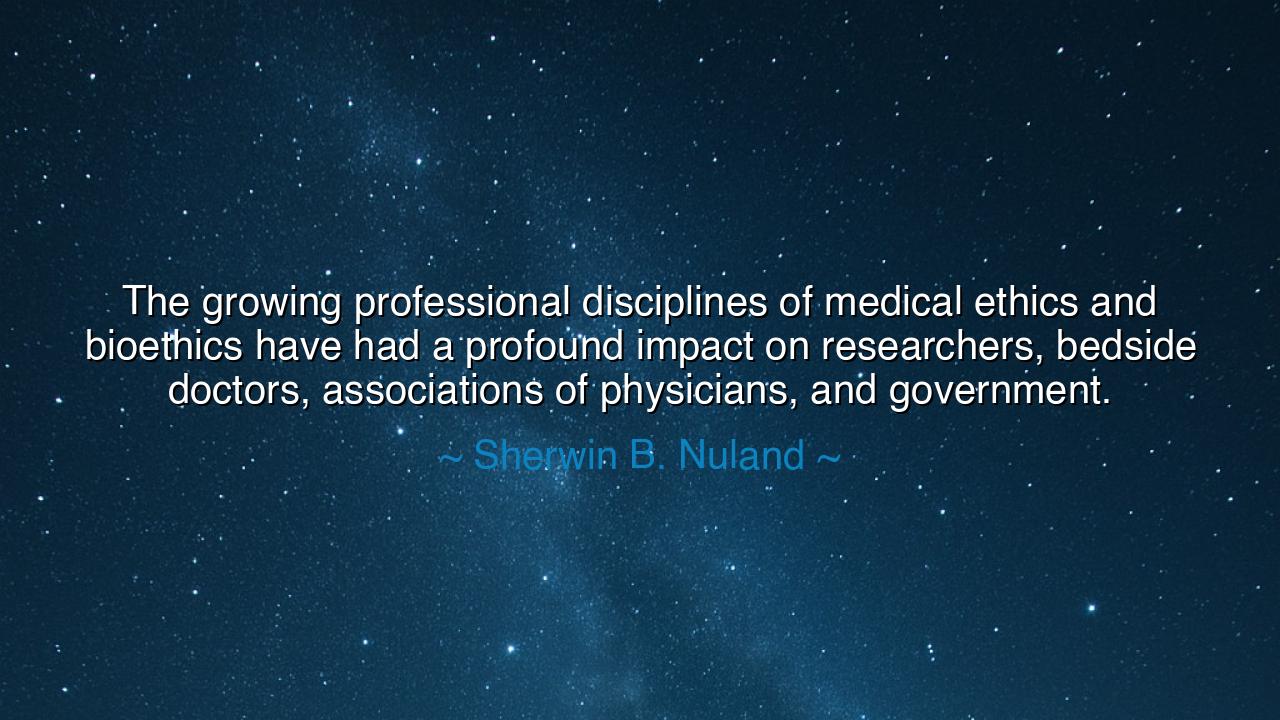
The growing professional disciplines of medical ethics and
The growing professional disciplines of medical ethics and bioethics have had a profound impact on researchers, bedside doctors, associations of physicians, and government.






When Sherwin B. Nuland proclaimed, “The growing professional disciplines of medical ethics and bioethics have had a profound impact on researchers, bedside doctors, associations of physicians, and government,” he gave voice to a truth that shines like a guiding flame in the labyrinth of modern medicine. His words remind us that knowledge without conscience is dangerous, and power without morality is ruinous. In the ancient struggle between wisdom and ambition, Nuland affirms that the safeguard of humanity lies not only in discovery, but in the righteous governance of that discovery.
The meaning of his statement lies in the recognition that the healing arts are not merely technical pursuits but moral vocations. Medical ethics and bioethics act as the compass by which physicians, scientists, and lawmakers navigate the turbulent seas of progress. To wield the power to cut, to cure, to transplant, or to alter the very fabric of life itself is to stand upon sacred ground. Without the guidance of ethics, such power could easily descend into cruelty or exploitation. Nuland’s declaration is thus a hymn to the necessity of conscience in every sphere of medicine.
The origin of this wisdom is carved deep into history. After the atrocities of the Second World War, when human beings were subjected to horrific experiments in the name of science, the world awoke with horror to the dangers of unbridled research. From that abyss arose the Nuremberg Code and later the Belmont Report, foundations of modern bioethics, which declared that human dignity must never again be sacrificed upon the altar of progress. Nuland’s words stand as heirs to these declarations, reminding us that ethics is not an ornament of medicine, but its very lifeblood.
History gives us vivid examples of this principle in action. Consider the scandal of the Tuskegee Syphilis Study, where men were left untreated so that researchers might observe the natural progression of disease. The revelation of such injustice ignited outrage and helped birth the modern discipline of bioethics, ensuring that oversight, consent, and compassion became central to all medical practice. Here, we see Nuland’s truth: the impact of ethics reshaped not only researchers, but doctors at the bedside, physicians’ associations, and even the policies of governments.
Yet his words also look forward, to the new dilemmas of our time. Cloning, genetic engineering, artificial intelligence in medicine — each offers staggering promise, but also peril. It is not enough for the scientist to ask, “Can we do this?” The greater and more sacred question is, “Should we do this?” The disciplines of medical ethics and bioethics arm us with the wisdom to ask that question, and the courage to answer it rightly, even when ambition tempts us toward recklessness.
The lesson for us is eternal: progress must walk hand in hand with morality. To heal without compassion is to wound, and to discover without conscience is to endanger the very lives we seek to save. Each generation must therefore cultivate both knowledge and ethics, so that the flame of science becomes not a wildfire of destruction, but a hearth of healing. This is not a task for physicians alone, but for government, for institutions, and for every citizen whose life will be touched by the power of medicine.
Practical actions follow naturally. Support the teaching of ethics as fervently as the teaching of science. Demand transparency in research, and uphold the dignity of patients above all things. Encourage physicians not only to sharpen their minds but to refine their consciences, for the trust of the suffering rests upon them. And as individuals, when faced with medical choices, seek not only what is possible, but what is right.
Thus Sherwin B. Nuland’s words endure as a beacon: that the greatness of medicine is not only in its power to cure, but in its fidelity to humanity. The rise of medical ethics and bioethics is one of the crowning achievements of civilization, ensuring that progress does not trample dignity, but uplifts it. May we, like the healers of old, remember always that the highest science is compassion, and the highest discovery is the recognition of the sacred worth of every human life.






AAdministratorAdministrator
Welcome, honored guests. Please leave a comment, we will respond soon